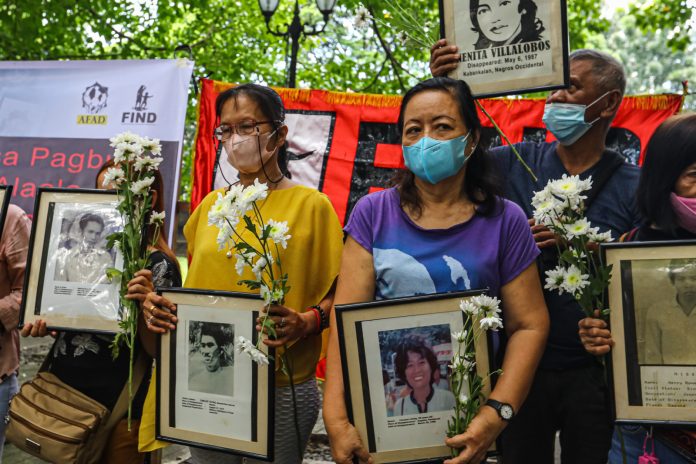We have no graves on which to place our lighted candles. Even after decades of looking for and not finding our loved ones, we cannot declare them finally and officially gone because there is no body.
That is the case of all victims of enforced disappearance, more popularly known as desaparecidos. Thus when the Feast of All Souls and the Feast of All Saints come, the families of victims try to find creative ways to remember their missing.
In previous years before the pandemic struck, members of Desaparecidos Philippines, an organization of families and friends of victims of enforced disappearances, would use the occasion to organize events, meet, and make calls to the government to surface their disappeared.
It is also an opportunity to make people aware that there is such a thing as cases of enforced disappearance, and that the horrible phenomenon can happen in a democratic country such as the Philippines, and is actually happening all over the world in this modern day and age.
Enforced disappearance happens when “persons are arrested, detained or abducted against their will or otherwise deprived of their liberty by officials of government, or by organized groups or private individuals acting on behalf of, or with the support, direct or indirect, consent or acquiescence of the government, followed by a refusal to disclose the fate or whereabouts of the persons concerned or a refusal to acknowledge the deprivation of their liberty, which places such persons outside the protection of the law.” (UN Office of the High Commissioner for Human rights).
A continuing crime, because the victims are never found while the families continue with their never-ending search and justice and truth being forever elusive, the commemoration is not conducted in cemeteries or beside graves because precisely there are no bodies to bury.
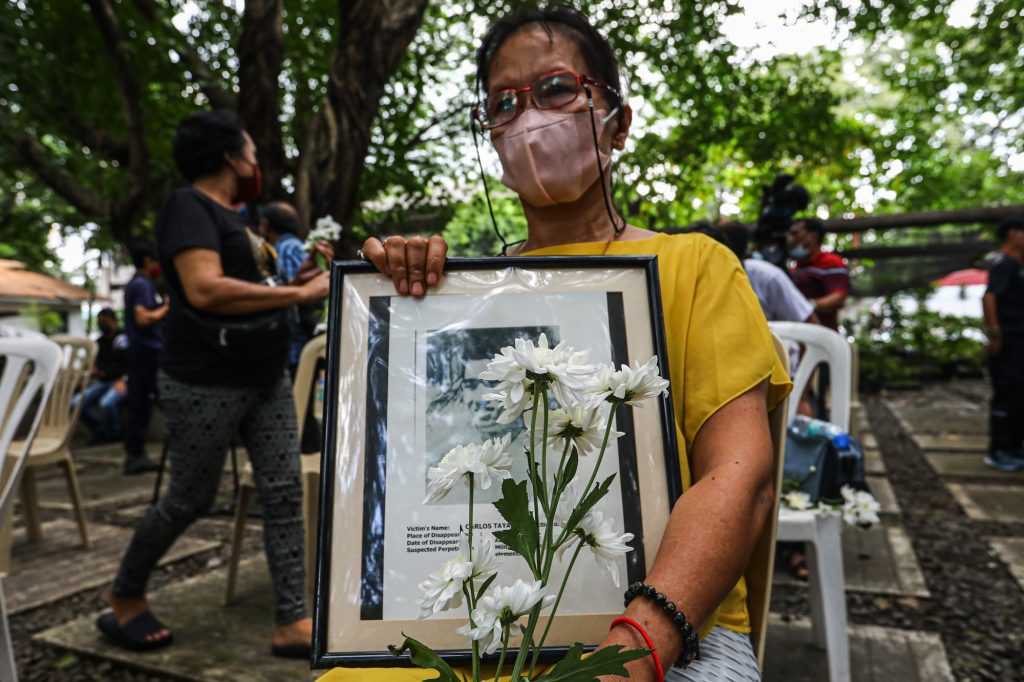
Different venues where such activities are allowed, such as in Plaza Miranda, at the heart of the city of Manila; in the Baclaran church grounds in Pasay City, where a memorial to the disappeared has been erected; in the Quezon Memorial Circle, a public park; and in the Bantayog ng mga Bayani Foundation grounds, where the Wall of Remembrance on which the names of martial law martyrs are enshrined, are chosen.
An exhibit of pictures of the disappeared from the martial law period to the present is put up. Artistic installations and souvenirs of the disappeared add depth to the exhibits. Usually passersby stop to ask about the exhibit and volunteers from the families of the disappeared are only too glad to answer the questions of those who ask.
A program where flower offerings, candle lighting, truth telling and offering of songs, original poems and various symbols of affection, the usual highlight, is participated in by the families. A simple picnic, where the place allows, is held. This done, somehow, there is a sense of “fulfilling” an obligation to our missing on a day that they should be remembered and honored, and the anguish over not having graves where we can light candles and offer flowers is eased.
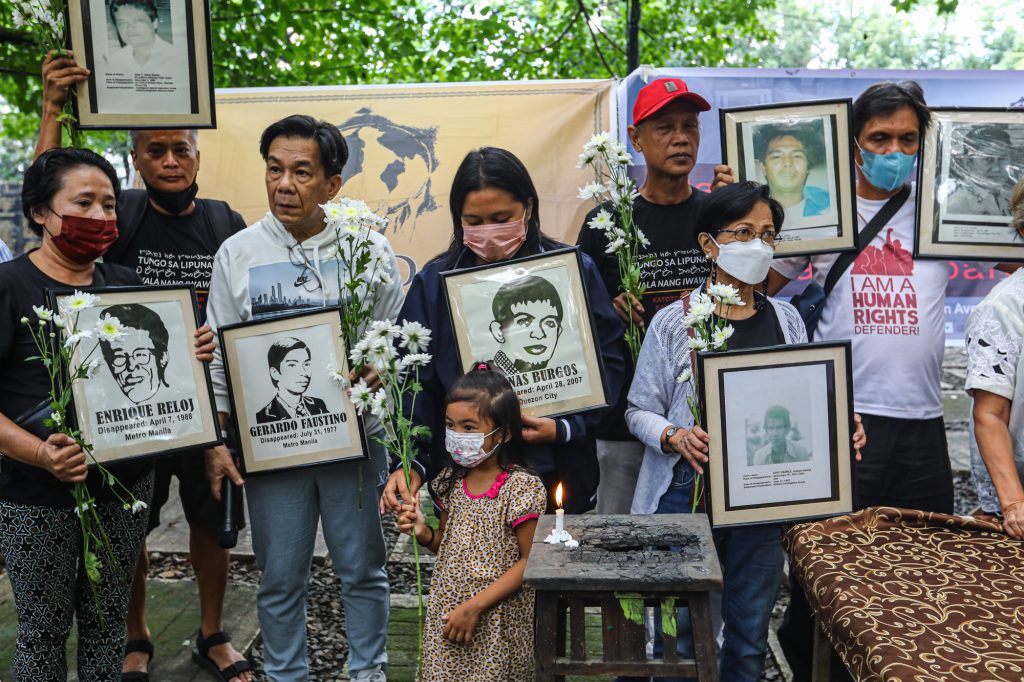
Like all aspects of the Filipino’s social life affected by the pandemic, the commemoration of the Feast of All Souls and All Saints by the Desaparecidos Philippines has been through virtual activities.
This year, 2022, the families contented themselves with posting pictures of the families holding pictures of their missing loved ones while holding a lighted candle beside the picture in the organization’s website and in each of the individual’s pages on social media.
There were calls to surface the disappeared. We know even before this is done, that the calls will fall on deaf ears. But this is not a reason not to remind the government that it has not done its duty to protect its citizens.
In truth and in fact, whether it be a birthday, Christmas, Easter, Father’s or Mother’s day, graduation of a child, or simply pinning a medal on a disappeared’s child who is cited for academic honors in school, families find a way to make sure that the missing’s presence is felt by the family on special occasions.
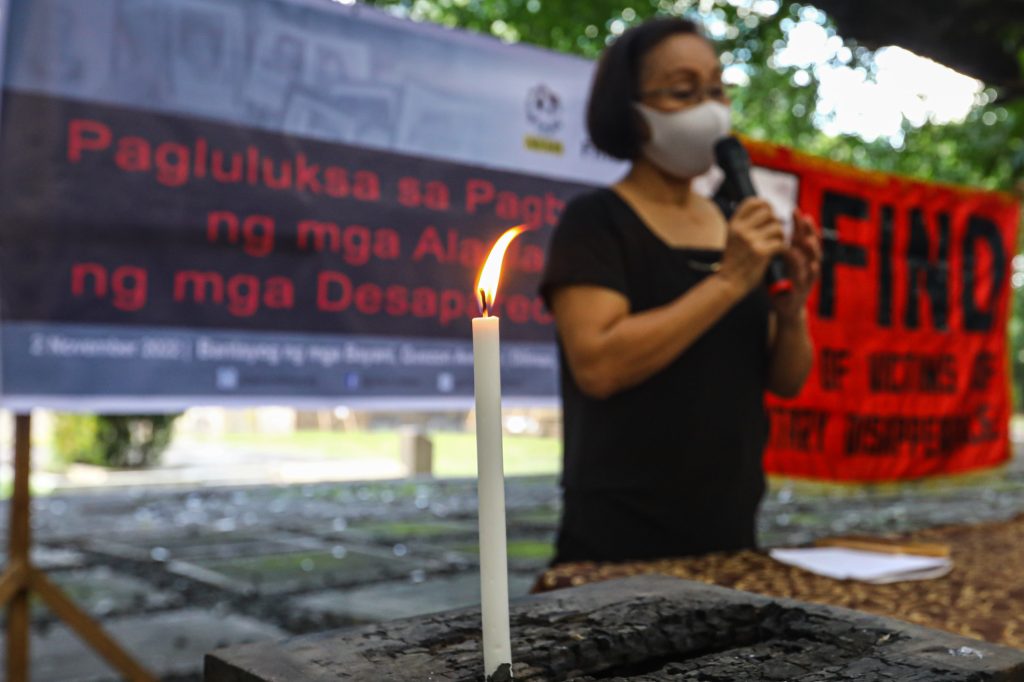
I know a girl whose father was taken when she was just seven years old. Her father, a labor leader of a big soft drinks company, was disappeared at the height of a violent outbreak during a strike. Today, more than three decades later, she still makes Christmas cards for her father. An adult with her own family now, she has kept all the cards she made and continues to make one every Christmas time. When I asked her why, she admitted that by making a card she felt his presence, then she is assured that he knows she remembers him.
My granddaughter, whose father was a victim of enforced disappearance, would always be thrilled to blow the cake her mother bakes on her father’s birthday. The family gathers for a meal and some drinks and the stories would center on what my son would have wanted for that meal, as if his presence would be conjured just by remembering.
It was never easy to celebrate special occasions related to the missing, but to the families of the disappeared there is an undeclared compulsion to celebrate because it is the only way to counter the abductor’s intention to make the victim disappear. If the families do not remember, there is the danger that the victim will be forgotten and the truth will never be found.
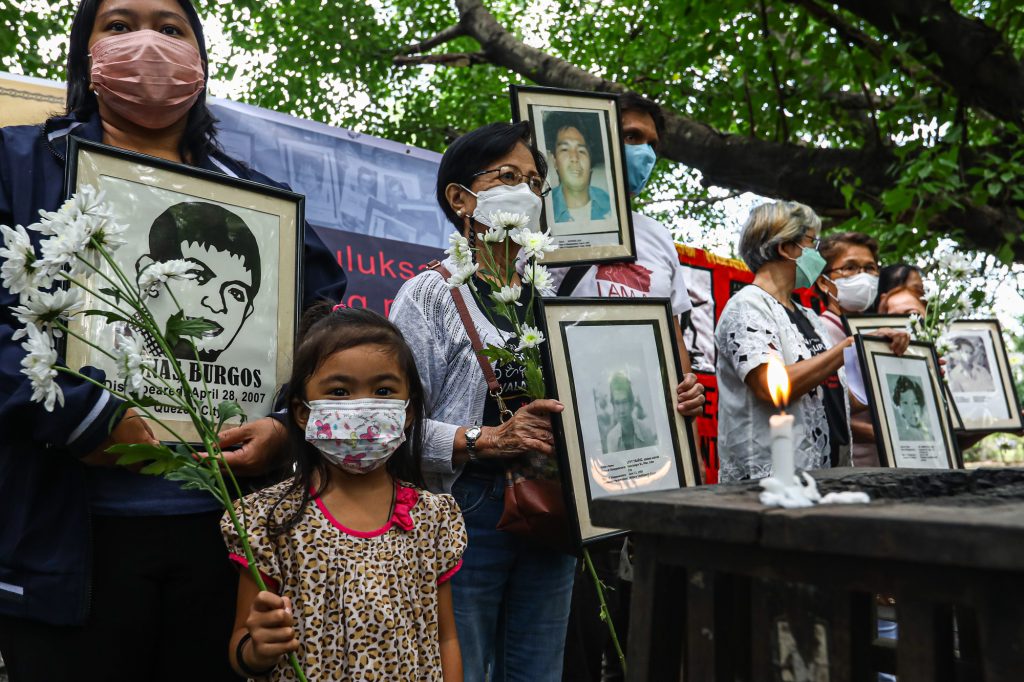
But the most difficult to commemorate is All Souls’ Day. The remembering is accompanied by an uncertainty of the state of the victim. The hesitancy is brought on by a denial of the reality that the victim will never be found and the acceptance of the finality that he (or she) is already gone.
If we lighted a candle on All Souls’ Day for the victim of enforced disappearance, there is this nagging notion that it is an admission that the victim is already dead to say it bluntly. Although some argue that a lighted candle could mean light, hope and enlightenment. But to light a candle on All Souls’ Day definitely sends the message of a declaration that the person is already in the next world.
In the small community of the desaparecidos, we have heard stories of some victims being sighted alive and held in captivity long after they have been taken. They are kept alive for years to be enslaved by their captors. This story was bolstered by two victims who escaped their captors. I was able to hear their testimony in court.
This farmer and his brother were taken from their house in front of their families. Accused of being rebel sympathizers, they were heavily tortured and held captive for years. They washed the clothes and cooked for the soldiers and did most of the cleaning of the barracks in the camp. Since they were farmers before their abduction, they were made to till the land of a military general, the superior of their captors. Eventually this work was a blessing in disguise because it gave them the opportunity to escape.
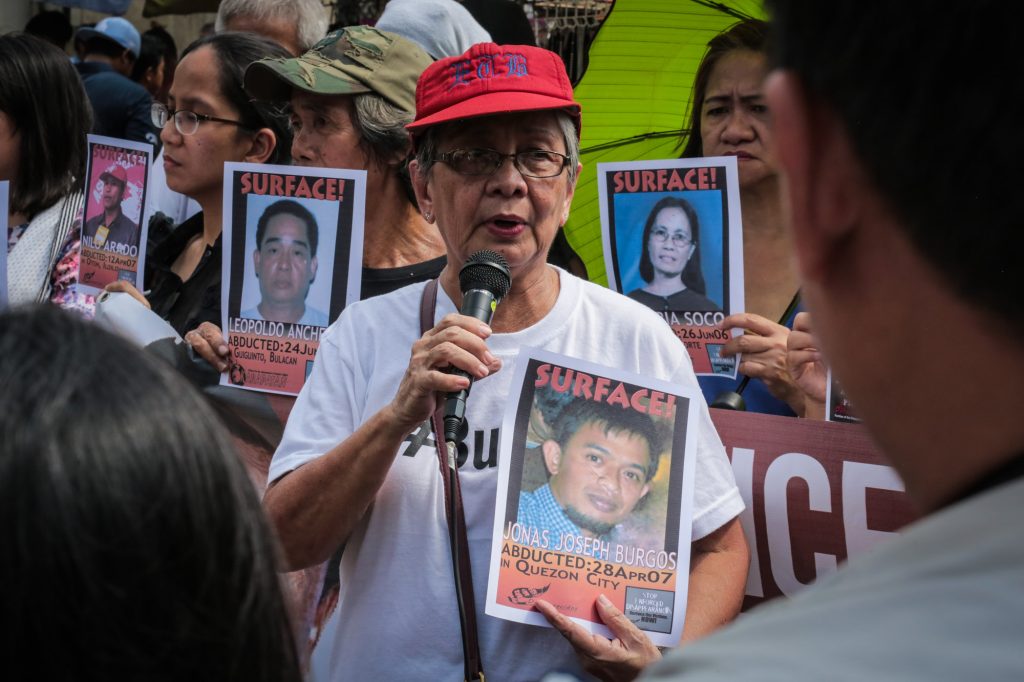
Another story was told about a student activist who was abducted in the far south of Luzon. Given up for dead, the family stopped looking for him. After several years, a distant relative chanced upon him alive in the mountains of Quezon gathering firewood. Recognizing his nephew, the relative accompanied the boy to his “home.” There he learned that the boy, who was heavily tortured to the extent that he could no longer remember who he was, was given a new identity and adopted by a poor farmer family.
There is the story of eight victims of enforced disappearance whom I met in a conference I attended, who were able to return home after 18 years. They were kept alive to do forced labor in camps. Luckily their camp was overrun by rebels, enemies of the state.
Stories like these, nurtured by the hope that one’s own disappeared would return someday, do not die.
Alexander Pope said “Hope springs eternal in the human breast.” So on the feast of All Souls’ Day, though I light a candle in our veranda and offer a prayer for him, I also prepare my son’s favorite dish. If he does not knock on our gate and ask “What’s for dinner Mom?” the food will not go to waste.
Edita Burgos is a doctor of education and a member of the Secular Order of Discalced Carmelites. Gunmen — believed to be soldiers — abducted her son Jonas Burgos in Manila in April 2007. He is still missing.

